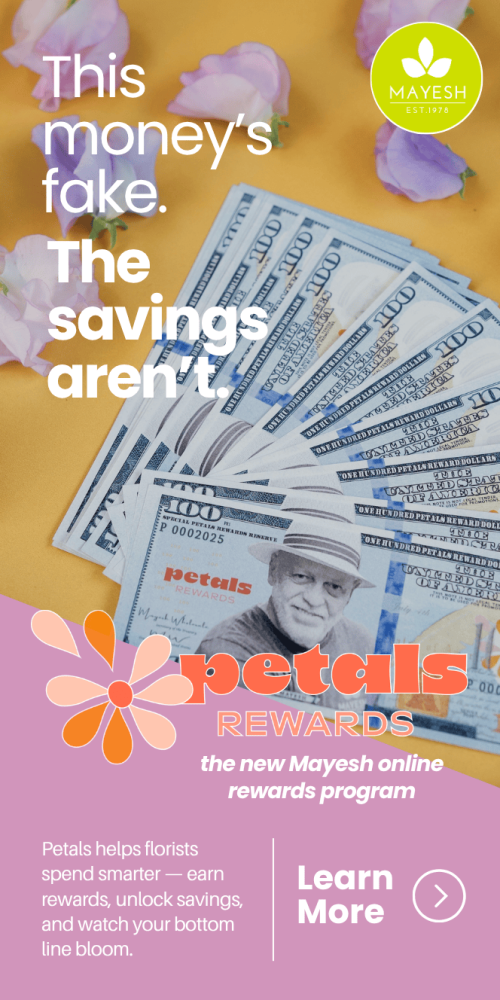Establishing successful partnerships with your suppliers is built on understanding, effective communication, trust, and a mutual commitment to quality and customer satisfaction. Here are some insights on doing just that.

By Nita Robertson, AIFD
Working effectively with wholesale florists is crucial for a retail florist’s business, whatever type it is, because it can impact the availability, quality and cost of flowers—and so much more. Having access to and building relationships with wholesalers who have high-quality products and no-limits customer service, as well as far-reaching product knowledge and sourcing options, can make all the difference in a retailer’s success.
Wholesale florists play a vital role in the flower industry by handling all of the details of sourcing products for their retail customers. They take charge of issues such as logistics—securing the requested types, varieties and quantities of flowers from growers locally and internationally; coordinating shipments; storing product; and ensuring timely and accurate fulfillment of orders. This often involves handling issues with product availability, substitutions and quality for their customers. These things, although monumentally important, are just the tip of the iceberg of services wholesalers provide.
I recently spoke with Joost Bongaerts, owner of Florabundance, located in the picturesque coastal town of Carpinteria, Calif. Renowned as a leading provider of wholesale fresh cut flowers, foliages, bouquets and more to florists, event companies and other professionals in the floral industry across North America, Florabundance works with hundreds of growers around the world.

“A flower wholesaler can add tremendous value to retail florists and wedding and event designers,” Bongaerts says. “The right color combinations, providing freshness and a variety of options, and delivering floral designers need are very important. Our Floral Wholesale Consultants, who are sales representatives with floral design backgrounds, have close working relationship with their customers. In fact, many Florabundance customers ask their consultants to choose flowers for them in specific palettes and surprise them within their budgets. That means they have developed a large level of trust!”
During the busy weddings and events season, Bongaerts recommends that florists place the bulk of their orders three to four weeks in advance. “Our website allows them to do that, and their consultants watch over their orders until it is time to ship. Purchasing from a local grower or directly from an importer may be effective until they receive a notification stating, ‘Sorry, not available,’ or when the wrong colors are shipped. Working with a wholesaler gives floral businesses the advantage of a consistent, year-round, fresh cut flower supply while providing them with many specialty and premium flowers and foliages to choose from,” he concludes.

At United Wholesale Flowers in San Jose, Calif., Store Manager Andrew Vu also emphasizes the significance of ordering flowers and supplies well in advance of a holiday, a wedding or an event. He points out that “prebooking” for holidays enables florists to obtain better prices while providing wholesalers with valuable insights into market demand. Early ordering also provides wholesalers the crucial time they need to adequately source and secure requested products, especially when large quantities and specific flower varieties or colors are involved, which often require wholesalers to source from multiple growers and coordinate the logistics.

Boundless customer service, reliability and communication are the keys to having great experiences with wholesale florists. Another dominant wholesale supplier in our industry is DWF, which was established in 1909 as a partnership of Colorado flower growers and is based in Denver, today has 15 branch locations in 13 states. The company provides not only the freshest selection of everyday and seasonal flowers but also an extensive selection of the latest and greatest supplies. In addition, it offers a “Farmer’s Market” program, which provides florists with extra savings on direct-from-the-farm products. During a recent visit to DWF’s headquarters, I witnessed the company’s exceptional customer service and efficient order management system, highlighting the importance of reliability and communication in fostering a positive wholesale experience.
Mayesh Wholesale Florist, which is based in Los Angeles, Calif., has 22 branch locations in 12 states and also offers, nationwide shipping as well as Miami-direct and Dutch-direct box lots. Yvonne Ashton, director of marketing, notes, “Communication, flexibility, patience and empathy are keys to establishing better relationships with wholesalers. This is done by clearly conveying your floral needs while remaining flexible on possible substitutions and giving adequate lead time for orders.”

Vu also stresses the importance of honest communication between retailers and wholesalers, and that goes both directions. Without it, wholesalers cannot adequately provide retailers with the best possible products and service, and retailers might develop unattainable expectations.
Beyond providing convenience and first-rate products and services, as well as shouldering the details, stress and responsibility of product sourcing for their customers, many wholesalers also offer educational resources ranging from in-house design shows, seminars and workshops to blogs, podcasts, article downloads, newsletters and much more. This is important to note because it further illustrates the commitment that most wholesalers have to the success of their retail customers, on many levels.

Tips for Creating Great Working Relationships with Wholesale Florists
1. Build Strong Relationships
Establish a good relationship with every wholesale florist with whom you do business. Frequent communication and mutual trust are key elements. Visit the wholesalers in person to learn about their operations and to build a personal connections. Allow sales reps to get to know you and your business—your target client, your brand/style, and your likes and dislikes. The better they know you, the better they can meet your expectations.
2. Communicate
Clearly communicate your needs and preferences. Provide details about the types of flowers, quantities and quality standards you require. Stay in touch regularly to be aware of any changes in product availability, pricing and promotions.
3. Order in Advance
Plan and place your orders for flowers, plants, supplies, etc., well in advance, especially during peak seasons or holidays, when demand is high. This gives wholesalers adequate time to source your required inventory.
4. Stay Informed About Seasonal Availability
Understand the seasonal availability of flowers. Some flowers are more readily available at certain times of the year, and it is important to know the specifics when you are planning holiday designs and selling floral décor for weddings and events. The best wholesalers will often be able to suggest alternative options if you miscalculate availability a bit.
5. Help Ensure Quality
Inspect the quality of flowers immediately upon their arrival at your business, and report any issues promptly to the wholesalers.
6. Leverage Bulk Purchases
Take advantage of bulk purchase discounts, especially with supply items. Wholesalers often offer lower prices for larger quantities, so plan your orders to take advantage of them.
7. Explore New Products
Stay informed about new flower varieties and hard-goods products. This awareness can help you be among the first to offer the latest and greatest items to your customers.
8. Be a Good Financial Steward
Understand the wholesalers’ payment terms, and abide by them. Timely payments will definitely strengthen your relationship with wholesalers.
9. Take Advantage of Educational Opportunities
Attend any in-person workshops, open houses and other events organized by wholesalers, and avail yourself of any online opportunities they may provide. Such efforts cost the wholesalers lots of money, and they offer them for your benefit. Taking advantage of such opportunities can not only provide valuable insights into wholesalers’ offerings, inspiration, floral design trends, business advice and marketing ideas but also foster networking opportunities with other florists and, oftentimes, growers and manufacturers.
10. Be Flexible
Be flexible with your orders, and be willing to adapt to changes in supply or availability. Flexibility, along with planning, can help you better navigate unexpected situations.
11. Provide Feedback
Offer honest and constructive feedback to wholesalers. This can help them to better understand your specific needs and expectations and to improve their services. Wholesalers want and need to know when you are not satisfied (and why), and most of them value such communication.
























